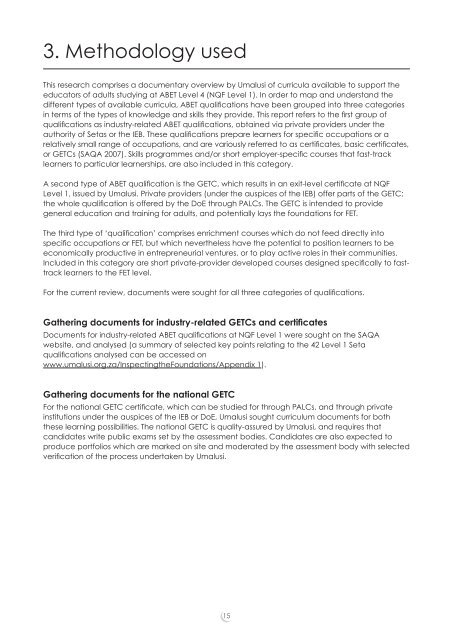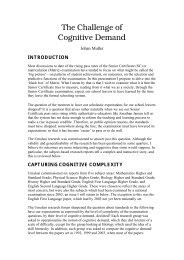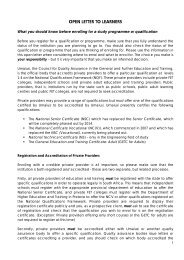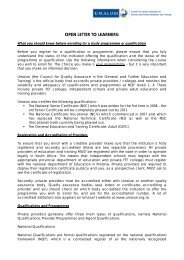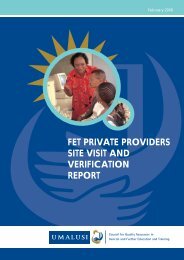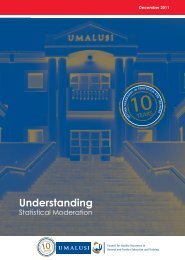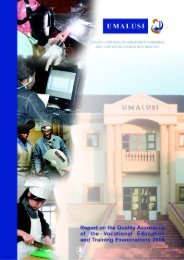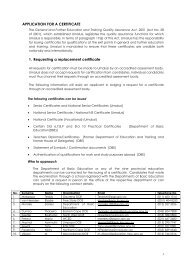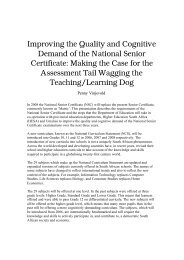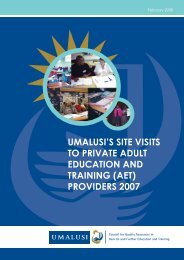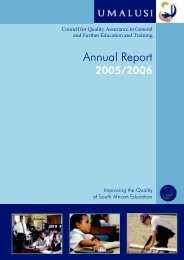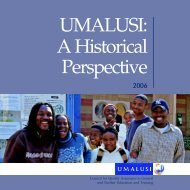3. Methodology usedThis research comprises a documentary overview by <strong>Umalusi</strong> of curricula available to support <strong>the</strong>educators of adults studying at ABET Level 4 (NQF Level 1). In order to map and understand <strong>the</strong>different types of available curricula, ABET qualifi cations have been grouped into three categoriesin terms of <strong>the</strong> types of knowledge and skills <strong>the</strong>y provide. This report refers to <strong>the</strong> fi rst group ofqualifi cations as industry-related ABET qualifi cations, obtained via private providers under <strong>the</strong>authority of Setas or <strong>the</strong> IEB. These qualifi cations prepare learners for specifi c occupations or arelatively small range of occupations, and are variously referred to as certifi cates, basic certifi cates,or GETCs (SAQA 2007). Skills programmes and/or short employer-specifi c courses that fast-tracklearners to particular learnerships, are also included in this category.A second type of ABET qualifi cation is <strong>the</strong> GETC, which results in an exit-level certifi cate at NQFLevel 1, issued by <strong>Umalusi</strong>. Private providers (under <strong>the</strong> auspices of <strong>the</strong> IEB) offer parts of <strong>the</strong> GETC;<strong>the</strong> whole qualifi cation is offered by <strong>the</strong> DoE through PALCs. The GETC is intended to providegeneral education and training for adults, and potentially lays <strong>the</strong> foundations for FET.The third type of ‘qualifi cation’ comprises enrichment courses which do not feed directly intospecifi c occupations or FET, but which never<strong>the</strong>less have <strong>the</strong> potential to position learners to beeconomically productive in entrepreneurial ventures, or to play active roles in <strong>the</strong>ir communities.Included in this category are short private-provider developed courses designed specifi cally to fasttracklearners to <strong>the</strong> FET level.For <strong>the</strong> current review, documents were sought for all three categories of qualifi cations.Ga<strong>the</strong>ring documents for industry-related GETCs and certificatesDocuments for industry-related ABET qualifi cations at NQF Level 1 were sought on <strong>the</strong> SAQAwebsite, and analysed (a summary of selected key points relating to <strong>the</strong> 42 Level 1 Setaqualifi cations analysed can be accessed onwww.umalusi.org.za/<strong>Inspecting</strong><strong>the</strong><strong>Foundations</strong>/Appendix 1).Ga<strong>the</strong>ring documents for <strong>the</strong> national GETCFor <strong>the</strong> national GETC certifi cate, which can be studied for through PALCs, and through privateinstitutions under <strong>the</strong> auspices of <strong>the</strong> IEB or DoE, <strong>Umalusi</strong> sought curriculum documents for both<strong>the</strong>se learning possibilities. The national GETC is quality-assured by <strong>Umalusi</strong>, and requires thatcandidates write public exams set by <strong>the</strong> assessment bodies. Candidates are also expected toproduce portfolios which are marked on site and moderated by <strong>the</strong> assessment body with selectedverifi cation of <strong>the</strong> process undertaken by <strong>Umalusi</strong>.15
National and provincial documents for <strong>the</strong> GETCA list of <strong>the</strong> ABET documents developed by <strong>the</strong> National DoE was compiled by <strong>Umalusi</strong> offi cials wi<strong>the</strong>xperience in ABET, and verifi ed by ABET offi cials in <strong>the</strong> DoE. The documents were obtained bothfrom <strong>the</strong> <strong>Umalusi</strong> Resource Centre and from offi cials in <strong>the</strong> DoE.Several critical National DoE documents underpin <strong>the</strong> GETC for adults. Four of <strong>the</strong>sedocuments were obtained for this review:• Department of Education Policy Document on ABET of 2000, which gives generalinformation such as background information for ABET, good practice, and levels and fi eldsof learning.• ABET Act No. 52 of 2000.• Assessment Policy in <strong>the</strong> General Education and Training Band gazette (GovernmentGazette No.6397; Vol. 402, of 1998), which has since been revised for Grades 4–9 in formalschooling, but not for ABET.• Learning Programme Guidelines for ABET, an undated 76-page booklet distributedby <strong>the</strong> Directorate of Adult Education and Training in <strong>the</strong> National DoE. This bookletcontains information described in broad terms, including broad defi nitions of ABETlearning programmes; learnerships; learning pathways; notes on designing, planning, andimplementing learning programmes; and assessment, with some exemplars of <strong>the</strong> types ofactivities that could be used for assessment.Then, via telephonic interviews, concerted attempts were made to ascertain which ABETdocuments were being used in <strong>the</strong> nine provinces, both at <strong>the</strong> provincial department level and at<strong>the</strong> PALC level.It soon emerged that different documents are being used across <strong>the</strong> provinces, and, when followupcalls were made, that different people within single provincial ABET directorates mentioneddifferent documents from one ano<strong>the</strong>r. Efforts were made to triangulate within-provinceinformation: additional ABET offi cials within single provinces were interviewed until <strong>the</strong> informationgiven was consistent.The researchers attempted to obtain all provincial learning programmes, but <strong>the</strong>se were not easilyavailable as copies are not electronic, and <strong>the</strong>re were often no spares. Five of <strong>the</strong> six provinceswith provincial learning programmes never<strong>the</strong>less kindly provided copies of <strong>the</strong>se programmes for<strong>the</strong> review.During <strong>the</strong> telephonic interviews, provincial ABET offi cials were also asked about <strong>the</strong> directoratesacross which ABET was spread, and <strong>the</strong> areas <strong>the</strong>y thought needed improving in ABET. Thesequestions were asked in order to better contextualize <strong>the</strong> information <strong>Umalusi</strong> was seeking.In <strong>the</strong> attempt to triangulate and confi rm <strong>the</strong> information supplied by <strong>the</strong> provinces, <strong>the</strong>researchers tried to interview <strong>the</strong> centre managers of ten PALCs in each province telephonically,with a view to fi nding out about ABET curriculum documents which <strong>the</strong> PALCs obtained from <strong>the</strong>irprovinces, and those <strong>the</strong>y developed <strong>the</strong>mselves. Four provinces provided PALC contact details.Contacting PALCS was not straight-forward and involved considerable phoning around: contactdetails on provincial lists were often for schools which did not have readily-available contact detailsfor <strong>the</strong> PALC managers; sometimes schools for which details were provided were not PALCs atall. PALC managers were asked about which ABET courses were offered at <strong>the</strong>ir centres, and <strong>the</strong>approximate number of learners currently registered for <strong>the</strong>ir ABET courses.The PALCs differ in that some offer <strong>the</strong> full range of ABET learning areas for <strong>the</strong> GETC; some offeronly a few of <strong>the</strong>se learning areas; some offer only what appear to be enrichment courses, and16


